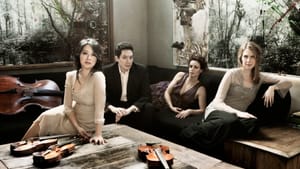Stay in the Loop
BSR publishes on a weekly schedule, with an email newsletter every Wednesday and Thursday morning. There’s no paywall, and subscribing is always free.
Spacey music
The Penn Museum's 'Black Angels and Secrets: An Extraordinary Evening with the Daedalus Quartet'

One of the many joys of hearing music in live performance is the effect of the venue on one’s senses, whether it is the serene elegance and intimacy of an 18th-century church, or the all-enveloping lushness of the Academy of Music. In some rare instances, the setting for a concert becomes an active element in the music itself, which was certainly the case for the Daedalus String Quartet at the Chinese Rotunda of the Penn Museum.
Our seats were flanked by a pair of roaring, ready-to-pounce Chinese dragons, while arrayed across the front of the stage were three versions of the Buddha, radiating a sweet repose. It was a dramatic contrast that was eerily reflected in the music, which featured three works by living American composers.
The most profound effect the space had on the music was its acoustical quality. With ceilings that soar to 90 feet, the room is shaped like a giant coffee can. That vast height, plus the reflective terra cotta walls, creates extreme reverberation that in normal circumstances would wreak havoc on the music’s texture.
Site-specific sound
Two of the pieces on the program were conceived with precisely that acoustical imperfection in mind. Joshua Hey, currently completing his doctoral thesis at Penn, presented a new work evocatively titled "lens flare from Alpha Centauri."
Harnessing the reverberating timbres produced some startling effects: a viola that sounded lonely yet sultry, like a freight train barreling through the night; a cello imitating a horn. Hey carefully structured his music to create far more sounds than would be heard in a conventional string-quartet presentation. His overall language might be described as impressionistic or, perhaps more accurately, spectral, a style that is a contemporary French descendant of the early 20th-century style of impressionism practiced by Debussy and Ravel. Spectral composers are especially interested in the relationship between sound and light, and in the closing pages of this music, Hey conjures a rainbow of colors that finally reflects the astronomical inspiration of the piece.
Voices carry
Scott Ordway’s piece, "Tonight We Tell the Secrets of the World," had its premiere in this same space just one year ago. It is even more theatrical than Hey’s music, incorporating projected color and audience participation. The audience was divided three ways, and each section was handed a reading from an ancient text (my section had an excerpt from Sumerian creation myths, circa 3000 B.C.E.). As a designated color splashed across the Rotunda walls, we were asked to recite our texts in a whisper, louder if the color intensified. We were accompanied by the string quartet augmented by a third violin, a second viola, bass, saxophone, and soprano.
Ordway’s creation was the sum of its seemingly simple parts. The music proceeded in well-regulated intervals, both rhythmically and harmonically, and the vibrato-less soprano and offstage saxophone added subtle texture. As an organic whole, the work resonated with humanist spirituality, haunting the imagination long after the last echo died away.
Between these two works, Daedalus Quartet presented one of the most celebrated chamber music works in the contemporary repertoire, George Crumb’s "Black Angels," with choreography by Sebastienne Mundheim. I have heard this brilliant music live before and have several recorded versions, but this was as compelling as any performance in my experience. The music can be sensational, but this reading crystallized the composer’s uncanny ability to project ferocity and the beatific in the same voice. "Black Angels" was completed in 1970, and, as the composer admits, “will probably be forever known as the ‘Vietnam Quartet.’” When I interviewed Crumb about the piece over a decade ago, he noted that the music had fresh resonance because of “this business with Iraq.” As we enter a new era of our history with notably sinister overtones, Crumb’s music again speaks to our time. Perhaps, alas, it will always be so.
What, When, Where
Black Angels and Secrets: An Extraordinary Evening with the Daedalus Quartet. Bowerbird and Penn Music Department. Joshua Hey, lens flare from Alpha Centauri; George Crumb, Black Angels; Scott Ordway, Tonight We Tell the Secrets of the World. Daedulus String Quartet; Min-Young Kim, violin, Matilda Kaul, violin, Jessica Thompson, viola, Thomas Kraines, cello. Also; Blake Espy, violin, Veronica Jurkiewicz, viola, Anne Peterson, doublebass, Aaron Stewart, saxophone, Ah Young Hong, soprano. January 13, 2017 at the Penn Museum, 3260 South Street, Philadelphia. (267) 231-9813 or bowerbird.org.
Sign up for our newsletter
All of the week's new articles, all in one place. Sign up for the free weekly BSR newsletters, and don't miss a conversation.